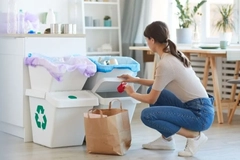August in review: Waste management in developing nations, The future of PLA, Biden’s plastic policy shift

02 Sep 2024 --- August began with The Circulate Initiative revealing that only 6% of global plastic waste management investments go to developing markets annually, and urged greater industry focus on adjusting this imbalance. Meanwhile, we spoke with TotalEnergies Corbion’s CEO Thomas Philipon about the future of the bioplastics market.
In a major policy shift, the US government announced its support of the “High Ambition Coalition” goals to cap global plastic production under the UN Global Plastic Treaty.
Among this month’s key developments, we look at some of the hottest topics, market dynamics and trends while speaking to some of the most prominent players in the industry.
August
Redirecting resources: Governments urged to raise waste infrastructure investments for emerging markets
Emerging markets received only 6% of plastic waste management investments over recent years, despite the greater impact of plastic pollution in these economies, according to the The Circulate Initiative — a non-profit that has recently released an investment tracker tool to aid funding for underfinanced regions. We sat down with Umesh Madhavan, research director at the initiative, to discuss geographical investment imbalances and the role reuse and refill solutions can play in addressing related issues. He emphasized that mobilizing finance to address plastic waste in emerging markets requires coordinated action among businesses, governments and other stakeholders in the value chain.
TotalEnergies Corbion CEO: Scaling bioplastics in the face of geopolitical uncertainties
 Coca-Cola Nigeria allegedly ignored warnings over misleading marketing in NIgeria.We spoke to Thomas Philipon, CEO of TotalEnergies Corbion, about the company’s R&D, business expansion, polylactic acid’s (PLA) human and environmental health impacts, geopolitical affairs and other issues. The company claims its Luminy PLA material brand, developed from sugarcane, has a 75% lower footprint than conventional plastics. But the sector is facing myriad challenges. PLA is used for various applications, including flexible packaging and nonwovens to durable goods and 3D printing. TotalEnergies Corbion is working with stakeholders, including Novolex, PepsiCo, Sansu and Danone.
Coca-Cola Nigeria allegedly ignored warnings over misleading marketing in NIgeria.We spoke to Thomas Philipon, CEO of TotalEnergies Corbion, about the company’s R&D, business expansion, polylactic acid’s (PLA) human and environmental health impacts, geopolitical affairs and other issues. The company claims its Luminy PLA material brand, developed from sugarcane, has a 75% lower footprint than conventional plastics. But the sector is facing myriad challenges. PLA is used for various applications, including flexible packaging and nonwovens to durable goods and 3D printing. TotalEnergies Corbion is working with stakeholders, including Novolex, PepsiCo, Sansu and Danone.
Final order issued against Coca-Cola Nigeria over misleading packaging claims
The US Federal Competition and Consumer Protection Commission issued a final order against Coca-Cola Nigeria (Coca-Cola) and Nigerian Bottling Company (NBC) for misleading trade descriptions and unfair marketing tactics related to the Coke beverage brand and other products. This decision was based on an investigation that began in 2019 when Coca-Cola and NBC initiated a transition in the Coke brand from a formulation containing regular sugar to one with non-nutritive sweeteners. According to the commission, despite warnings, the companies failed to take appropriate steps to modify false marketing.
Aicomp experts: How digitalization, automation and machine learning will define packaging’s future
We spoke to experts at Aicomp, a software specialist providing digital solutions to packagers, about the industry’s computational future. In 2000, the Aicomp founders identified a need for digitalization in the industry and began developing systems applications and products, software used to centralize and manage data management, to help companies boost their transparency and automation capacities. Initially working with paper packaging group Klingele Papierwerke, the team began utilizing a SAPs variant configurator to capture product-specific data and calculate possible production routes and material consumption, explained Matthias Waltz, head of product development at Aicomp.
Wood and aluminum outpace plastic and glass packaging, report finds
Wood and aluminum packaging product sales increased compared to plastic and glass, found a new report by Valpak and the Waste & Resources Action Programme (WRAP). The PlasticFlow report recommended that more research be carried out to quantify the recyclability of plastic packaging. It added that further work on the definition of agricultural films — such as what is classified as a packaging application — should be carried out. Griff Palmer, economist at WRAP, told Packaging Insights that the PlasticFlow report highlights the need for improved data accuracy for commercial and industrial plastic packaging films.
Circular economy education: Packaging consultants discuss developing industry training courses
We spoke to two packaging industry specialists about their education program “the Packaging Design for the Circular Economy Course,” which is built for stakeholders throughout the market. Richard Coles, a chemist and food scientist who has worked in the packaging sector for over 30 years, and Mike Swain, a materials scientist and industry consultant, spent the past four years developing the initiative so that it can cater to people across the value chain and change as the industry evolves.
“Double standard” games? Environmentalists slam plastic reduction claims at Paris 2024
 We spoke to Aicomp experts about computation in the packaging industry.While organizers of the Paris 2024 Olympic Games promised “waste-free” games with “zero plastic,” “the reality couldn’t be further from these statements,” Bénédicte Kjaer Kahlat, legal officer at Zero Waste France, told us. But Coca-Cola, the main sponsor of the international sporting event, responded to the allegations, defending its environmental efforts. Kjaer Kahlat said that at certain venues’ drinks stands run by Coca-Cola, servers were seen filling plastic reusable, so-called “eco-cups,” with beverages from 50 cL plastic bottles, which led to the vendors amassing sacks of empty plastic bottles. Environmental campaigners also said millions of plastic drink bottles being “needlessly poured into millions of plastic cups” was a “double use of plastic” and amounted to “greenwashing.”
We spoke to Aicomp experts about computation in the packaging industry.While organizers of the Paris 2024 Olympic Games promised “waste-free” games with “zero plastic,” “the reality couldn’t be further from these statements,” Bénédicte Kjaer Kahlat, legal officer at Zero Waste France, told us. But Coca-Cola, the main sponsor of the international sporting event, responded to the allegations, defending its environmental efforts. Kjaer Kahlat said that at certain venues’ drinks stands run by Coca-Cola, servers were seen filling plastic reusable, so-called “eco-cups,” with beverages from 50 cL plastic bottles, which led to the vendors amassing sacks of empty plastic bottles. Environmental campaigners also said millions of plastic drink bottles being “needlessly poured into millions of plastic cups” was a “double use of plastic” and amounted to “greenwashing.”
Australian research shows BPA exposure in food packs increases autism risks in boys
A new study found that bisphenol A (BPA), a chemical commonly used in plastic packaging and the lining of food cans, increases the risk of autism in young boys. The research showed that boys exposed to BPA in the womb are more likely to display autism symptoms by the age of two and are six times more likely to be diagnosed with autism by the age of 11. The researchers found that higher levels of BPA exposure are associated with the suppression of aromatase, an important enzyme in brain development, particularly in boys. This suppression is linked to an increased likelihood of an autism diagnosis.
Biden administration makes U-turn on UN Global Plastic Treaty position ahead of US election
Reports revealed that US administrators are reportedly intending to support plastic production caps and chemical bans in the upcoming UN Global Plastic Treaty, marking a reversal on the government’s stance toward the negotiations, for which it has so far opposed the “High Ambition Coalition” countries, who advocate for blanket rules limiting industrial production. Packaging Insights spoke to environmentalists celebrating the move, and to industry leaders who brand the decision a “betrayal.”
Plastic use can be halved without compromising fruit and veg shelf life, finds Canadian study
A new study commissioned by Agriculture and Agri-Food Canada and Environment and Climate Change Canada underscored the role of plastic packaging in fresh produce supply chains while identifying opportunities to reduce its use “without compromising key outcomes.” The research suggested that it is possible to reduce the plastic packaging of fruits and vegetables in Canadian retail stores by half without causing significant negative consequences. In response to these findings, the Canadian Produce Marketing Association cautioned that reducing packaging waste “must not come at the expense of other sustainability goals, such as food safety, waste prevention and the maintenance of sustainable supply chains.”
By Louis Gore-Langton











